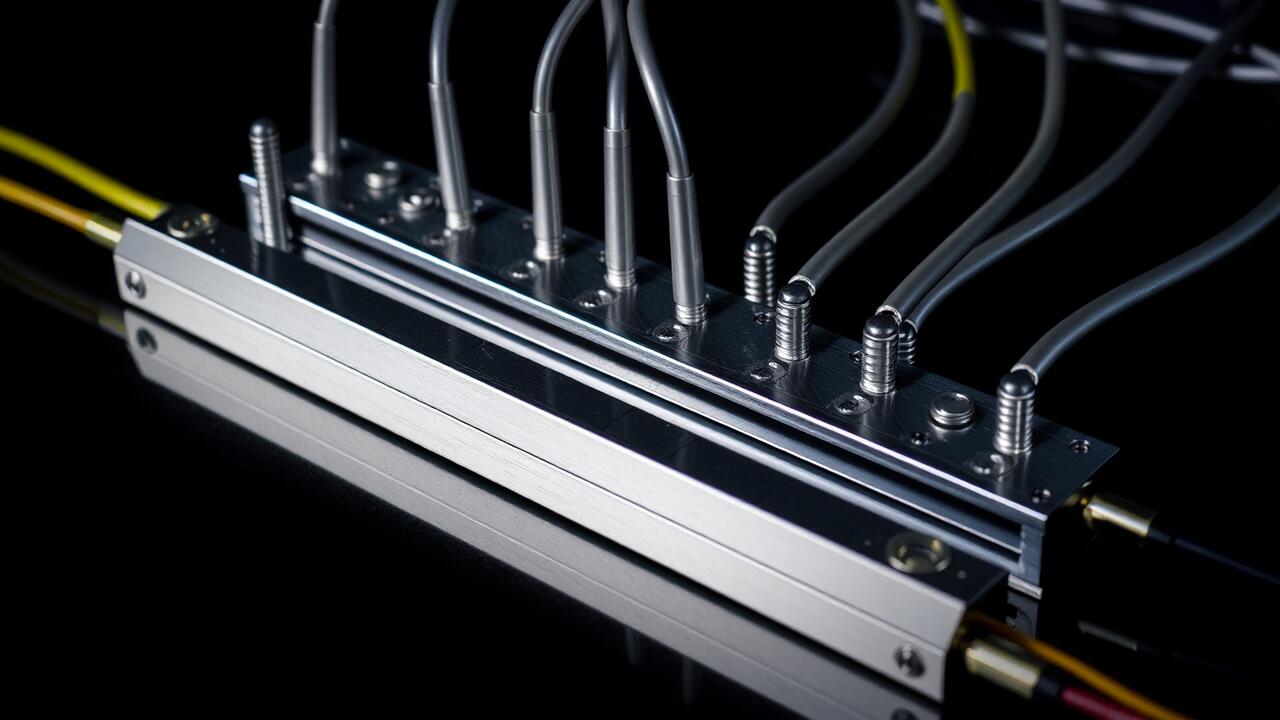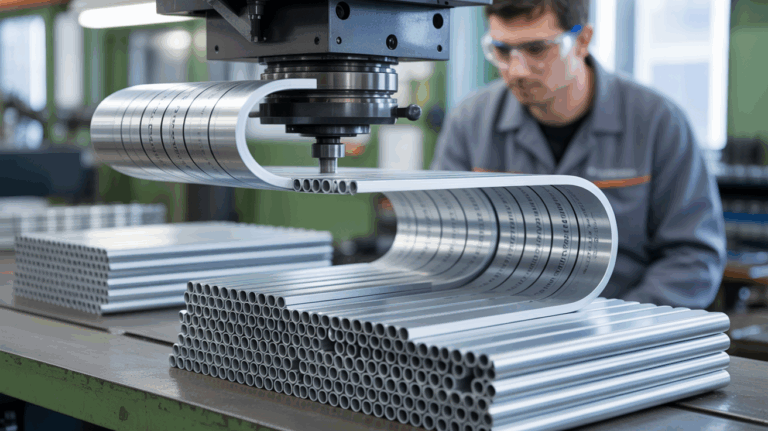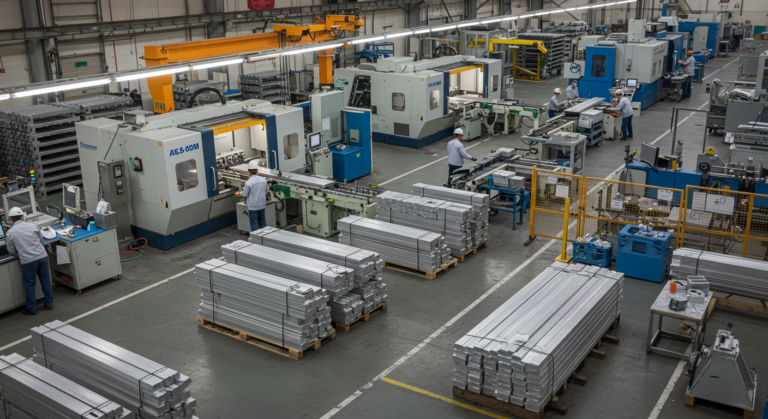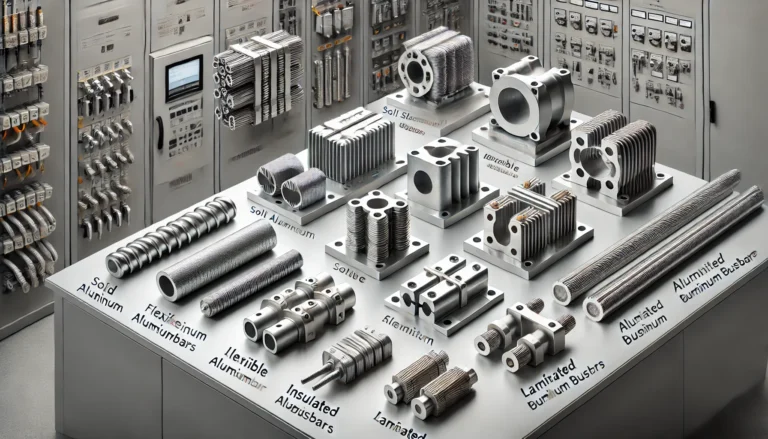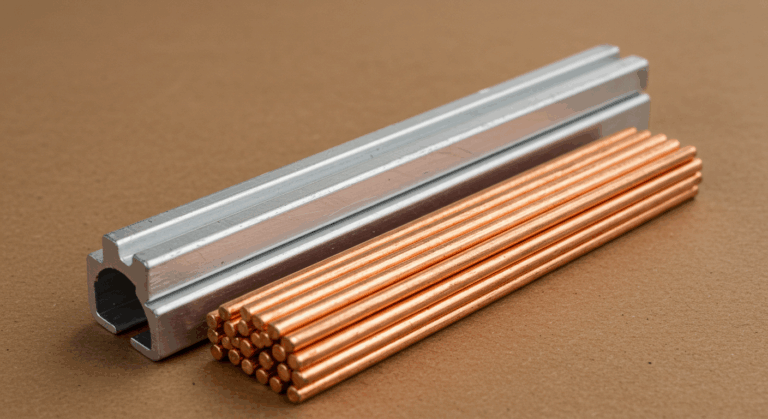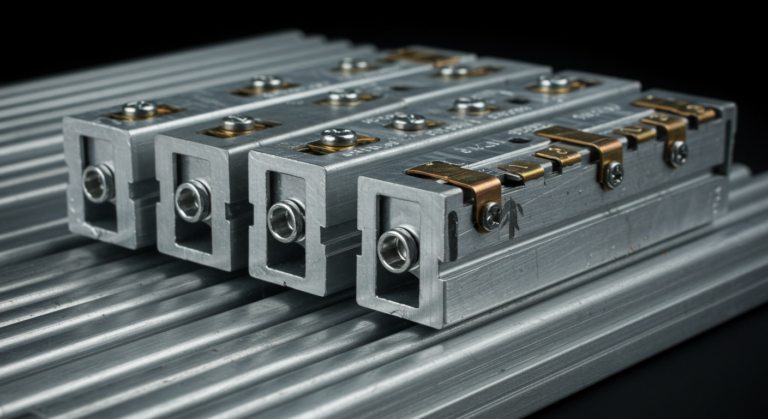Aluminum Busbars
Understanding Aluminum Busbars: A Comprehensive Guide to Aluminum Bus Bars and Their Applications
Key Takeaways
- Summary of aluminum busbars and their characteristics
- Varieties of busbars available in the industry
- Uses of aluminum busbars in different sectors
- Choosing appropriate materials for busbars
- Available busbar products in the marketplace
- Setting up and caring for aluminum busbars
Overview of Aluminum Busbars
Aluminum Busbars serve as essential components in electrical distribution systems, designed to conduct electricity efficiently while minimizing energy losses. These bus bars are made from aluminum due to its favorable conductivity, lightweight nature, and resistance to corrosion. Compared to traditional copper busbars, aluminum alternatives offer cost-effectiveness and lower overall weight, making them ideal for various applications. Aluminum Busbars are often utilized in bus ducts to facilitate power transfer in industrial and commercial settings. Employing the right type of bus bar can enhance the performance and reliability of electrical installations, ensuring safe and effective operation.
Definition and Functionality
Aluminum Busbars serve as vital components in electrical distribution systems, providing a conductive path for electrical current. These busbars are typically crafted from aluminum alloys, which enhance their electrical conductivity while ensuring lightweight characteristics. Industry standards often reference guidelines from sources like aluminum.org, underscoring the reliability and effectiveness of aluminum in this capacity. With their ability to facilitate the efficient transfer of electricity, Aluminum Busbars are essential in connecting various busways and distributing power across extensive systems.
The functionality of Aluminum Busbars goes beyond mere conduction. They play a crucial role in organizing and managing electrical connections in a bus system, which can include everything from switching gear to transformers. Their design allows for the use of aluminum wire, providing flexibility in installations and configurations. Aluminum can withstand harsh environmental conditions, making these busbars suitable for both indoor and outdoor applications. The use of aluminum alloys further enhances their durability and resistance to corrosion, ensuring long-term performance in demanding settings.
Advantages of Using Aluminum Busbars
Aluminum Busbars offer significant advantages due to their lightweight and high conductivity. Using 6061 aluminum or 6061-T6 aluminum ensures that the busbars can effectively handle electrical currents while minimizing weight, which is essential in applications such as transportation and vehicle manufacturing. These materials contribute to lower production costs and enhanced efficiency, making aluminum busbars an ideal choice for busway systems.
The use of copper clad aluminum further enhances the performance of aluminum busbars while reducing overall material expenses. These busbars can be easily customized to suit various applications, ensuring compatibility with specific needs in industrial settings. Their versatility allows for efficient installation and maintenance, proving beneficial for long-term operations in both commercial and residential projects.
Types of Busbars
Aluminum Busbars are essential components in various applications, especially when compared to copper-clad aluminum wire. Their lightweight nature makes them particularly suitable for industries such as aerospace and automotive, where weight savings are crucial for performance and efficiency. In many vehicles, Aluminum Busbars serve as an effective bus conductor, providing reliable electrical connections while minimizing the overall weight. The versatility of aluminum allows it to be utilized in manufacturing processes involving metals, including press brakes and other metalworking equipment. Understanding these distinctions helps engineers and designers select the right materials for their specific needs.
Aluminum Bus Bars vs. Copper Busbars
Aluminum busbars are increasingly favored over copper for various applications due to their lightweight properties and cost-effectiveness. This is particularly important in infrastructure projects where weight can significantly impact design and installation. Aluminum busbars can effectively handle high currents while minimizing thermal expansion and resistance. The use of silicone rubber insulation enhances the safety and reliability of these aluminum busbars, making them suitable for critical infrastructure projects.
Copper busbars, while known for their superior conductivity, can present challenges with weight and cost. The installation of copper busbars often requires more significant support structures, which can add complexity to the setup. In contrast, aluminum busbars offer a lighter alternative that can be efficiently integrated into systems without the need for extensive braking mechanisms. This combination of features makes aluminum busbars a viable choice for modern applications, particularly in industries seeking to optimize performance while controlling costs.
Conductive Aluminum Busbar Variations
Various series aluminum busbars are designed to enhance performance in different electrical applications. These conductive aluminum busbars provide a lightweight yet effective solution for power distribution. The aluminum busbar system is recognized for its excellent conductivity and corrosion resistance. Manufacturers offer a range of options, ensuring that users can select the right conductive aluminum busbar suited to their specific needs, whether for industrial installations or commercial use.
Customization plays a significant role in the development of conductive aluminum busbar solutions. Specific requirements such as size, shape, and configuration can be met through specialized designs of aluminum busbars. These tailored conductive aluminum busbars can improve overall efficiency and adaptability within an electrical system. Many customers benefit from quick quote options available for various aluminum busbar products, enabling them to make informed decisions based on project specifications and budget constraints.
Applications of Aluminum Busbars
Aluminum Busbars serve a vital role across various industries due to their exceptional conductivity and lightweight nature. This busbar material is often favored over copper busbars, particularly in large-scale electrical systems where efficiency and cost-effectiveness are paramount. The solid busbar construction of aluminum provides durability and reliability, making it suitable for demanding environments. Various busbar products are available on the market, allowing for customization based on specific requirements. Selecting the right busbar material is crucial to ensuring optimal performance, and the busbar manufacturing process can be tailored to meet diverse application needs. With the growing trend towards flexible and adaptable designs, Aluminum Busbars continue to be an essential component in modern electrical infrastructure.
Industrial Uses of Aluminum Bus Bars
Aluminum Busbars serve vital roles in various industrial sectors, providing efficient electrical distribution solutions. Many electrical systems rely on products such as electrical aluminum bus to ensure reliable performance. The busbar system is often designed for heavy-duty applications, making it ideal for environments with high electrical loads. Whether it’s the main power connection in manufacturing plants or the critical distribution point in large facilities, the need for robust busbar offerings continues to grow.
The versatility of Aluminum Busbars makes them suitable for a range of next busbar applications. Industries increasingly opt for cu-al busbar solutions due to their lightweight nature and excellent conductivity. With advancements in busbar production techniques, companies can customize their electrical aluminum bus configurations to meet specific operational demands. This adaptability enhances efficiency and reduces installation time, solidifying aluminum as a preferred material in many industrial settings.
Flexible Aluminum Bus Applications
Flexible Aluminum Busbars are increasingly utilized in various applications due to their adaptability and lightweight properties. These busbars are ideal for battery busbars in electric vehicles and renewable energy systems, offering a reliable connection while accommodating limited space. Their design allows for easier routing through complex electrical layouts, making them a preferred choice for those embarking on their next busbar project. With a variety of electrical busbar products available, manufacturers provide options that cater specifically to the needs of different installations.
The flexibility of these busbars extends beyond simple configuration. A short busbar can be easily integrated into tight spaces, optimizing the available area without compromising performance. As industries seek to enhance efficiency and reduce material costs, flexible busbars provide a promising alternative to traditional bus bar material. Websites like busbars.quick offer a range of customizable solutions, ensuring that projects can be tailored to specific requirements while maintaining the integrity of the electrical system.
Selecting the Right Busbar Material
Choosing the right busbar material is crucial for ensuring efficient electrical performance in various applications. Aluminum busbars have gained popularity due to their lightweight nature and lower costs compared to copper bus bars. While copper provides excellent conductivity, aluminum offers significant advantages such as corrosion resistance and reduced weight. Braided busbars made from aluminum components can improve flexibility and adaptability in different setups. For larger systems, opting for thicker busbars can enhance current-carrying capacity, making electrical bus bars safer and more efficient. Ultimately, careful consideration of these factors will lead to better-performing installations tailored to specific needs.
Factors to Consider for Busbar Selection
Selecting the right busbar material requires evaluating various factors such as electrical conductivity, thermal management, and mechanical strength. Aluminum Busbars are often preferred for their lightweight properties and good conductivity. For designs such as the multiple bar bus configuration, options like rectangular bar bus systems enhance performance in high-demand environments. Utilizing high-quality aluminum products ensures that the system operates efficiently, while the choice of aluminum connectors and bus bar fasteners can influence the reliability of the connections.
Cost considerations also play a crucial role in the selection process. Aluminum Busbars typically offer a cost-effective solution compared to copper options, making them a popular choice in numerous applications. It’s essential to match the aluminum air specifications with the environmental conditions and loads expected in the system. Proper selection of bus bar connectors and bus bar fasteners is vital to maintain the integrity of the busbar assembly over time, ensuring long-lasting performance and minimal maintenance needs.
Performance Comparison: Aluminum vs. Other Materials
Aluminum Busbars offer several advantages when compared to their counterparts made from materials like copper or steel. The lightweight nature of aluminum means that these components can be easier to handle and install within bus systems. An aluminum profile also allows for greater flexibility in design, which is often necessary in various industrial and commercial applications. This versatility can enhance efficiency and lead to cost savings, especially in large-scale installations where multiple aluminum busbars are required.
The performance characteristics of aluminum vary significantly when analyzed against other materials. While copper is renowned for its high conductivity, aluminum Busbars can still provide remarkable performance at a lower weight and cost. The correct bus bar material should be chosen based on specific application needs, as aluminum may offer a better solution in situations that prioritize weight reduction and resistance to corrosion. Overall, the choice of aluminum becomes a compelling option for many operational requirements in electrical distribution.
Busbar Products on the Market
The market for Aluminum Busbars offers a wide range of products designed to meet various industrial and commercial needs. Hot selling aluminum options have gained popularity due to their lightweight nature and superior conductivity. Custom aluminum solutions allow for tailored designs, ensuring optimal performance in specific applications. Electrical grade aluminum is often used to enhance efficiency, while round angle aluminum configurations facilitate easier installations in busway systems. With advancements in aluminum fabrication techniques, manufacturers are able to produce high-quality aluminum conducts that ensure durability and reliability in various settings.
Popular Aluminum Busbar Solutions
Aluminum Busbars offer a versatile solution for electrical distribution, proving advantageous in various applications. With aluminum fabrication delivering lighter and more cost-effective options compared to traditional materials, these conductive bars can support equivalent loads efficiently. The prevalence of CCA bus systems also highlights how aluminum’s affordability and performance shine, particularly in setups where reducing transportation costs is crucial.
Pure aluminum rates are often more favorable than other conductive materials, making aluminum busbars increasingly popular in commercial and industrial environments. Their effectiveness in handling high current loads leads to widespread usage in power systems. Customizable aluminum bus solutions are available, allowing for tailored configurations to meet specific energy requirements while ensuring optimal efficiency and reliability.
Customizable Busbar Options
Customizing aluminum busbars allows for versatile designs tailored to specific needs. Options include flat bars and panels crafted from high-purity form aluminium, ensuring optimal conductivity. These customizable solutions provide steel-like strength while maintaining a lightweight profile ideal for automotive applications. Such features enable equipment manufacturers to enhance performance without compromising structural integrity.
The ability to tailor aluminum busbars to fit particular applications broadens their usability across various industries. Custom designs can accommodate unique dimensions and configurations, making them suitable for a range of equipment. This flexibility is particularly beneficial in automotive lightweight designs, where minimizing weight while maximizing durability is crucial, allowing for advanced engineering solutions.
Installation and Maintenance of Aluminum Busbars
Proper installation and maintenance of Aluminum Busbars are crucial for ensuring their longevity and performance across various applications. Selecting the right thickness is essential to accommodate the electrical load and minimize resistance. These flat bars should be installed with consideration for their outer dimensions to facilitate seamless integration with other materials, such as copper ground bars. Regular inspections help identify signs of wear or corrosion that could affect functionality. Maintaining optimal operating conditions can significantly enhance the durability of Aluminum Busbars, making them an effective choice for many electrical systems.
Conclusion
Aluminum busbars play a crucial role in electrical distribution systems due to their lightweight and high conductivity. The aluminum busbar system is designed to efficiently carry electrical current, making it an optimal choice for various applications. Series aluminum busbars and conductive aluminum busbars offer flexibility and customization, adapting to the unique needs of different industries. The advantages of using aluminum bus include cost-effectiveness and lower weight compared to copper alternatives. As organizations increasingly seek energy-efficient solutions, the demand for aluminum busbars continues to rise, highlighting their significance in modern electrical engineering.
FAQS
What are the benefits of using aluminium busbars compared to copper counterparts in electrical applications?
Aluminum busbars offer several advantages over copper, including lower costs and lighter weight. In applications where an aluminum conductor is desirable, series aluminium busbars can provide equivalent loads while also allowing for thicker bus bars when necessary. Furthermore, the aluminum fabrication delivers robust conductive bus solutions that can withstand varying electrical demands compared to their aluminum counterpart. For a quick quote on our range of products, including electrical aluminum bus options, please contact us.
How do aluminum busbars compare to other busbar materials in terms of electrical performance and versatility?
Aluminum busbars are often preferred in electrical applications due to their lightweight nature and cost-effectiveness. When considering electrical performance, aluminum busbars can carry equivalent loads as copper, while also offering high conductivity. The range of products in electrical aluminum bus options is vast, and pricing varies; however, users can typically request a quick quote for reliable sourcing. Overall, aluminum busbars are a versatile choice for many installations.
How do different types of products and electrical aluminum bus solutions vary in their performance for specific applications?
The performance of products like electrical aluminum bus solutions and aluminum bar varies significantly depending on the specific application and equivalent loads they are designed to handle. To get a quick quote or more information on aluminum busbars, it’s essential to consider the requirements for your project and how the aluminum bus solutions can be tailored to meet them.
How do aluminum busbars handle equivalent loads in various electrical applications compared to other materials?
Aluminum busbars are designed to effectively manage equivalent loads in electrical applications, often providing advantages in terms of weight and cost. When considering products involving electrical aluminum bus solutions, it is essential to understand how aluminum varies in its performance characteristics, especially when seeking a quick quote for specific needs.
How can I obtain a quick quote for aluminum busbars and what options do you provide for electrical aluminum bus products that handle equivalent loads?
To obtain a quick quote for aluminum busbars, you can contact our sales team through our website. We offer a variety of products, including electrical aluminum bus solutions designed to manage equivalent loads effectively in various applications.
How can I request a quick quote for aluminum busbars and what types of electrical aluminum bus products do you offer that are designed for equivalent loads?
To request a quick quote for aluminum busbars, you can contact our sales team through our website or give us a call. We offer a range of products in the category of electrical aluminum bus that are specifically designed to handle equivalent loads across various applications.
What should I consider when looking for a quick quote on aluminum busbars for my electrical systems?
When seeking a quick quote for aluminum busbars, it’s important to consider the specific busbars—aluminum you require, the types of products in the electrical aluminum bus category, and how they perform at equivalent loads to ensure they meet your operational needs effectively.
What information do I need to provide when requesting a quick quote for aluminum busbars designed for specific electrical applications?
When requesting a quick quote for aluminum busbars, you should provide details about the products and electrical aluminum bus specifications needed, as well as the requirements for handling equivalent loads in your application.
How can I find quick quote options for aluminum busbars and what types of electrical aluminum bus products are available for handling equivalent loads?
To obtain a quick quote for aluminum busbars, you can contact suppliers directly through their websites or customer service. They typically offer a variety of products, including electrical aluminum bus solutions that are specifically designed to handle equivalent loads in various applications.
What is the quickest way to get a quote for aluminum busbars and what types of electrical aluminum bus products can efficiently handle equivalent loads?
To obtain a quick quote for aluminum busbars, you can contact our customer service or visit our website where we offer options for various electrical aluminum bus products designed to handle equivalent loads efficiently.

